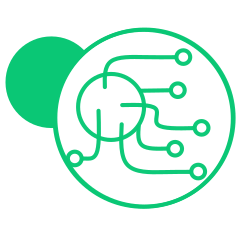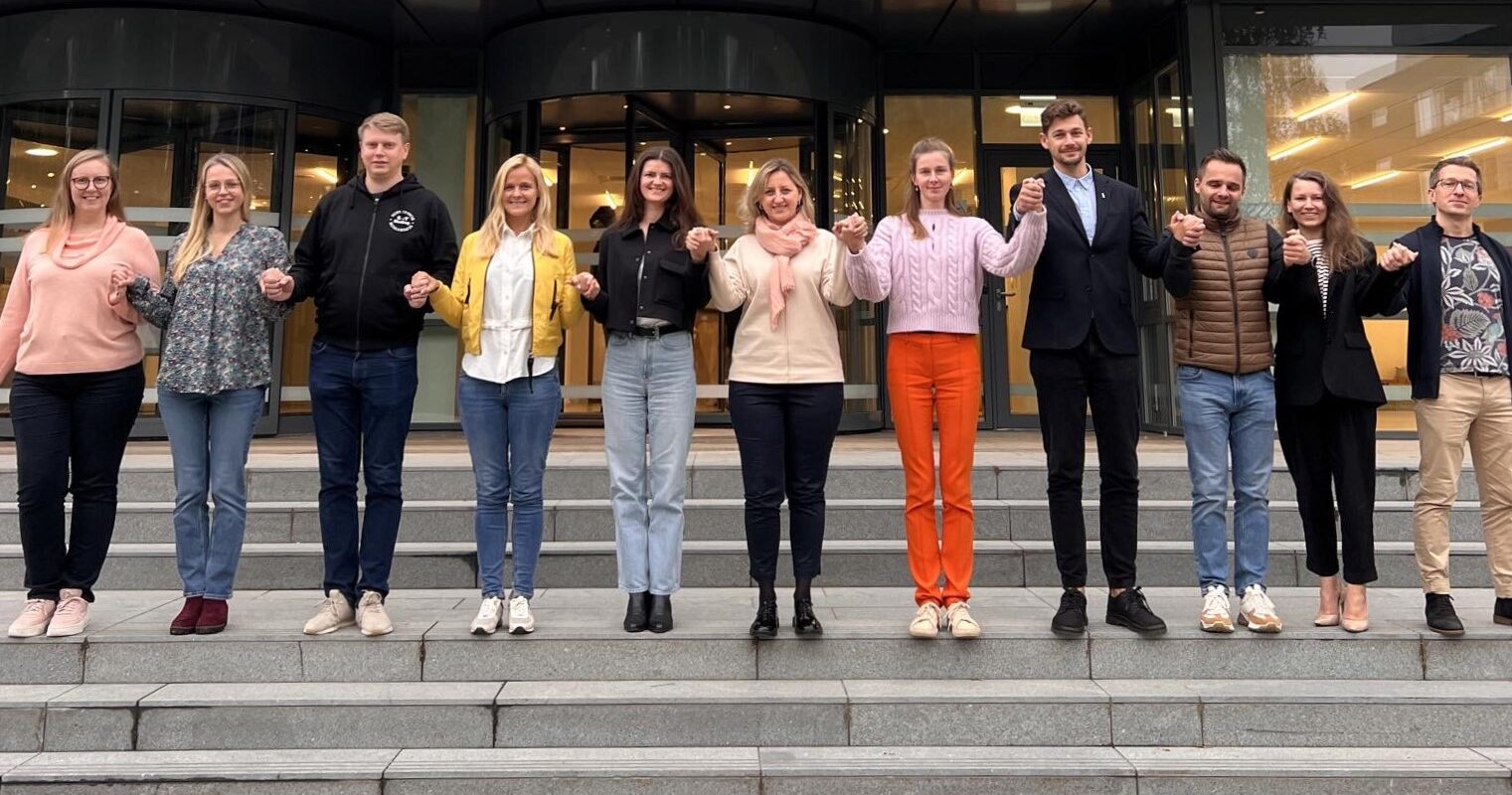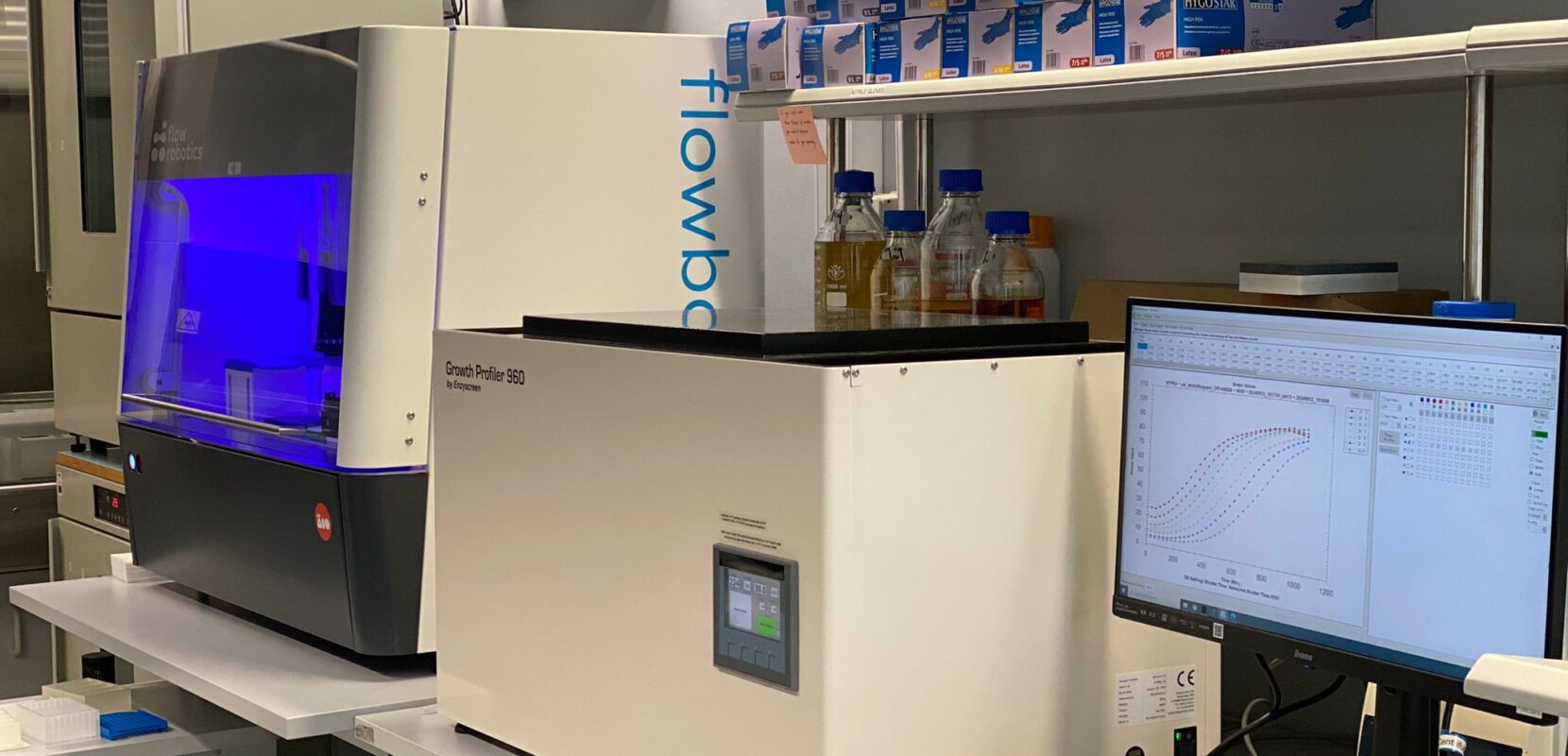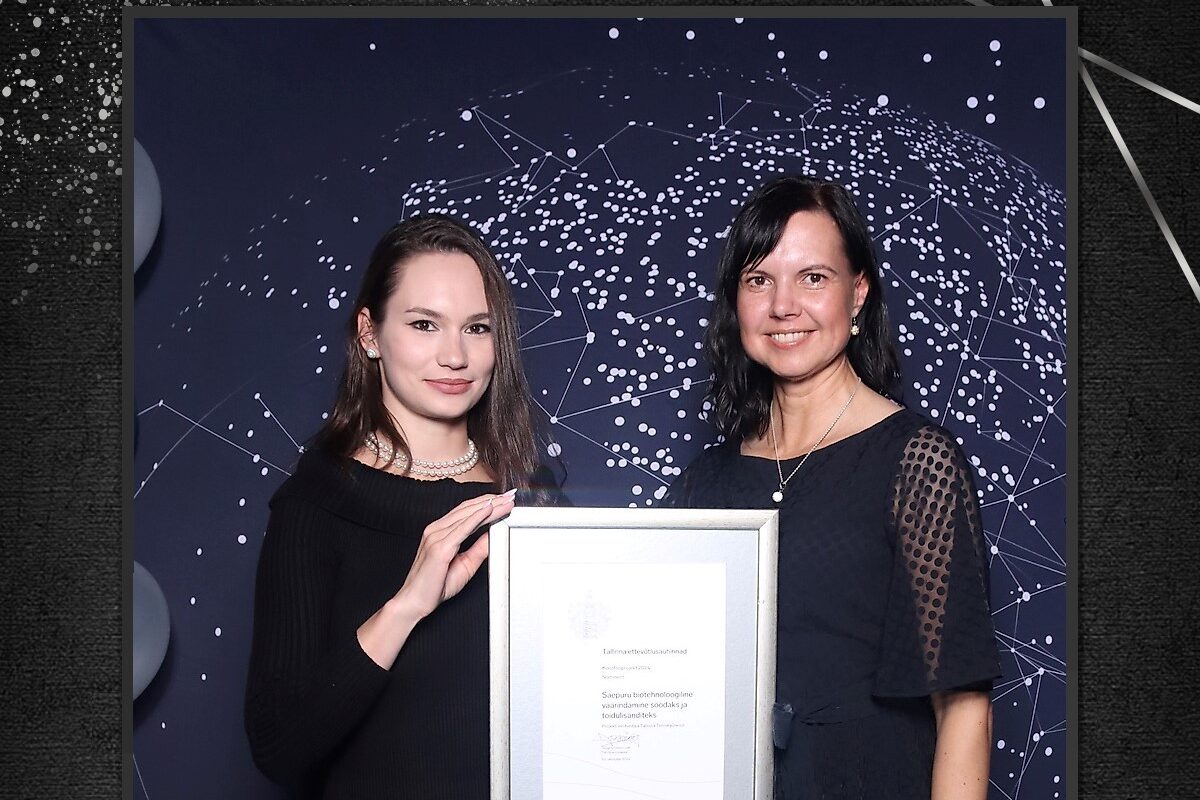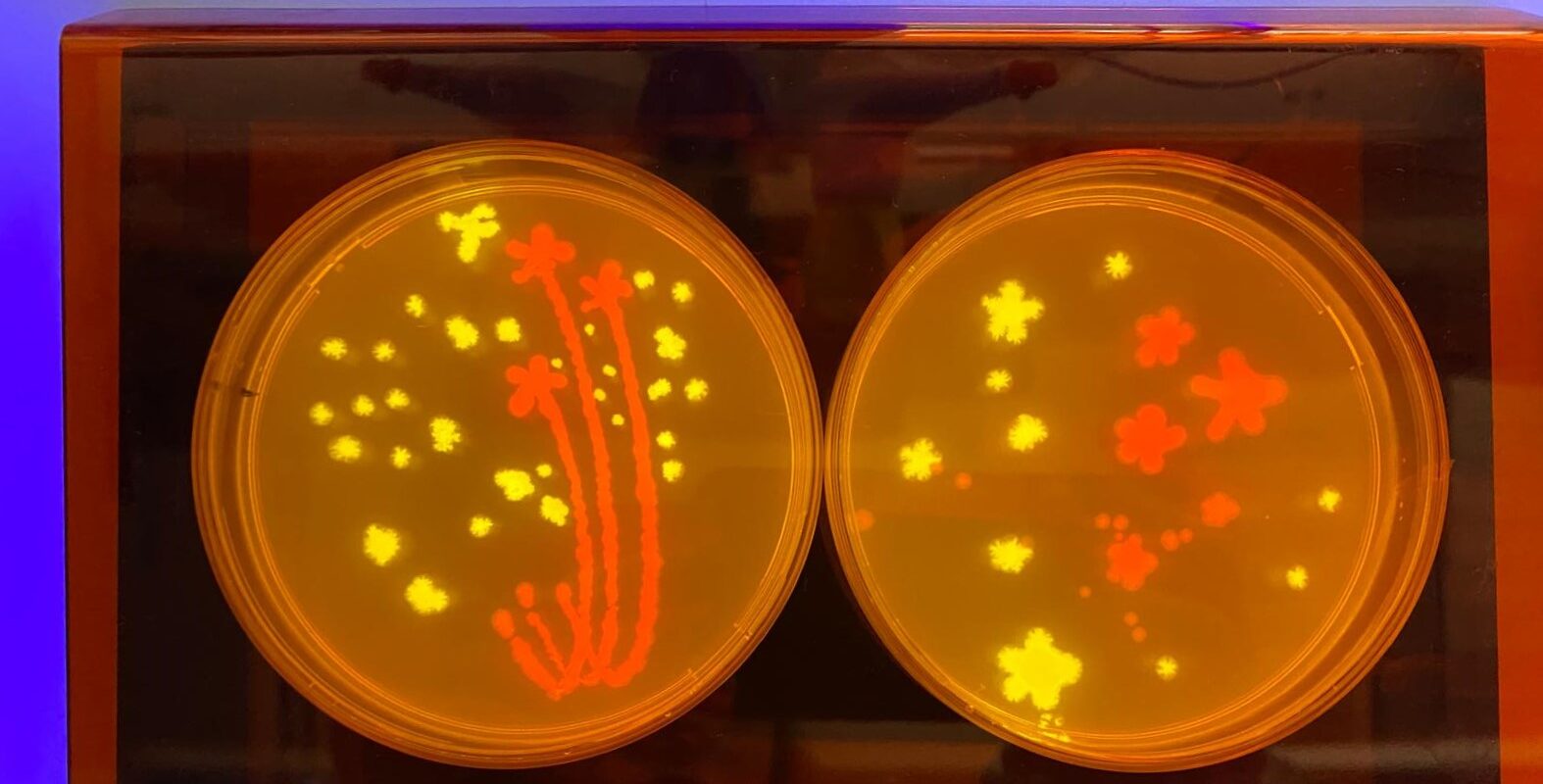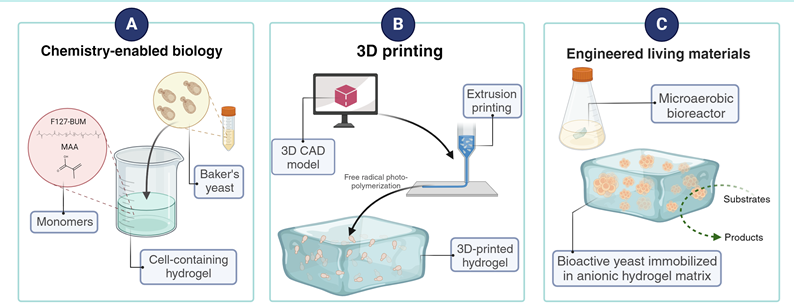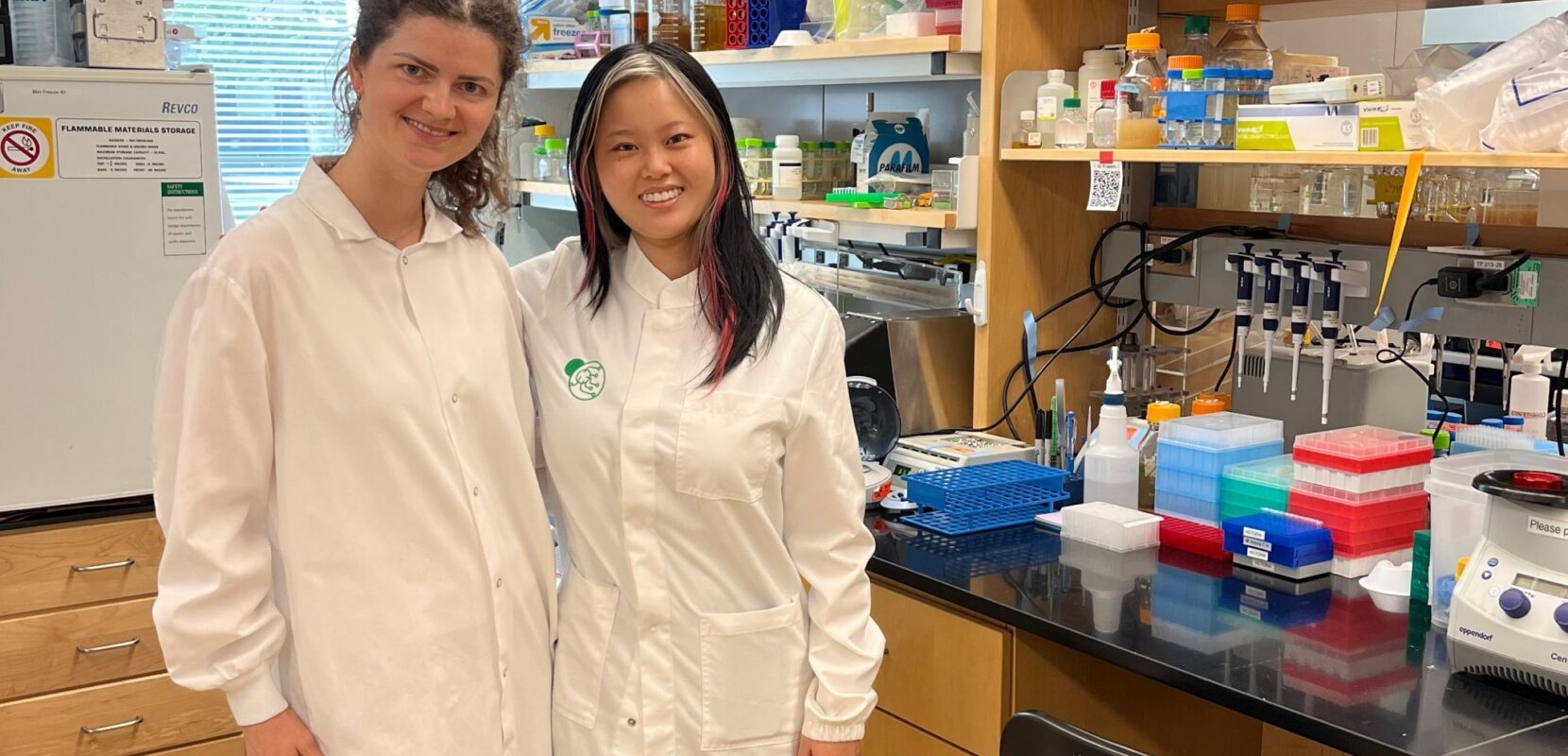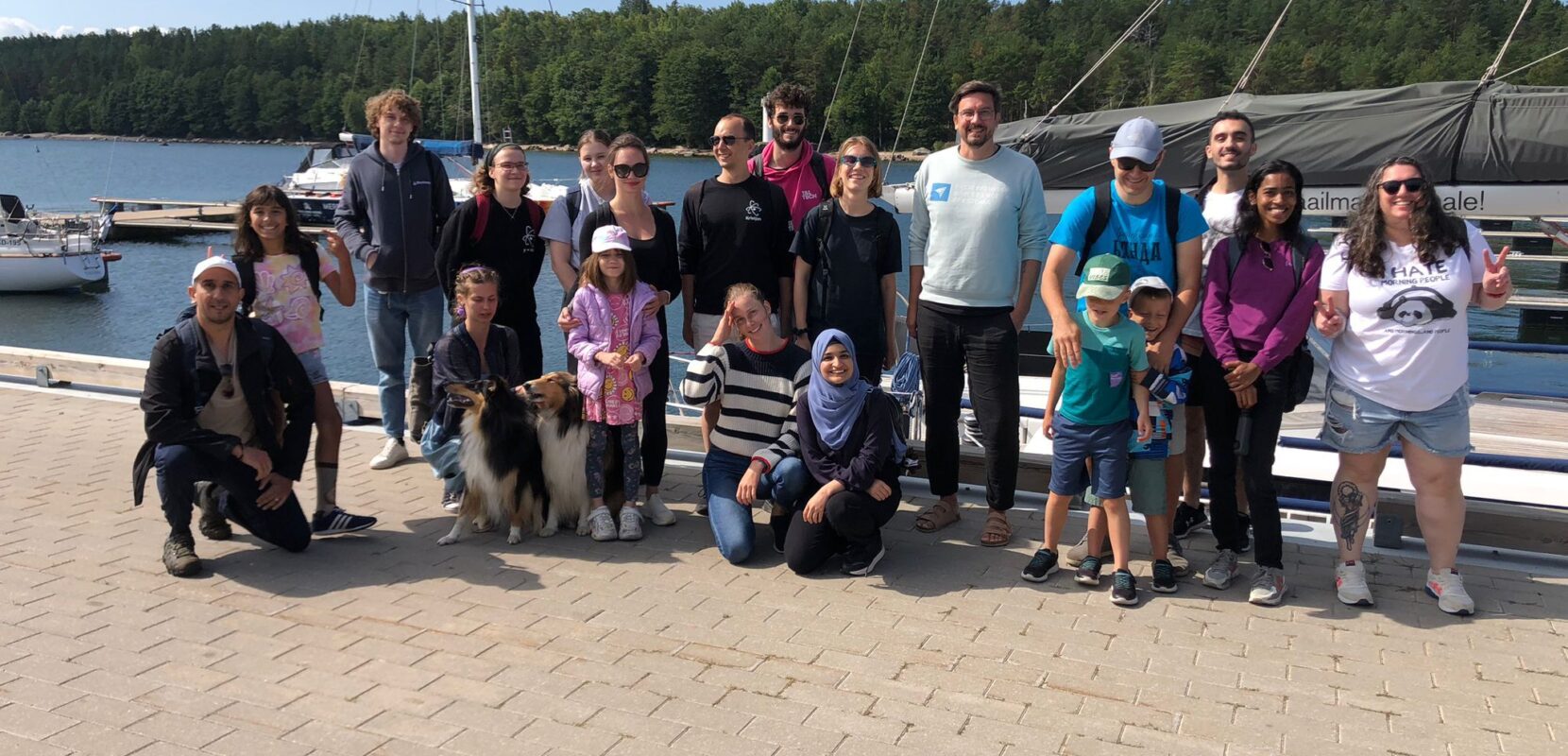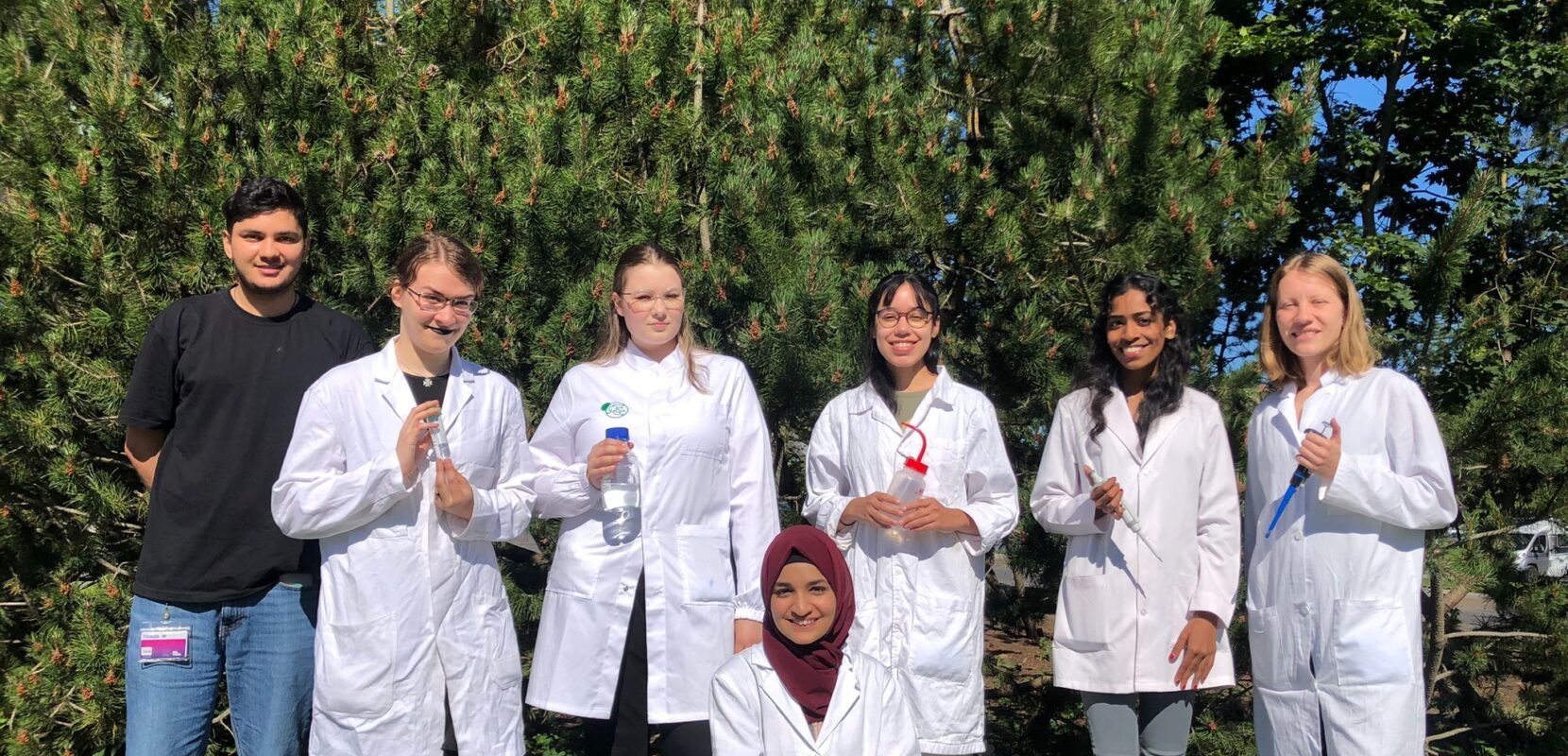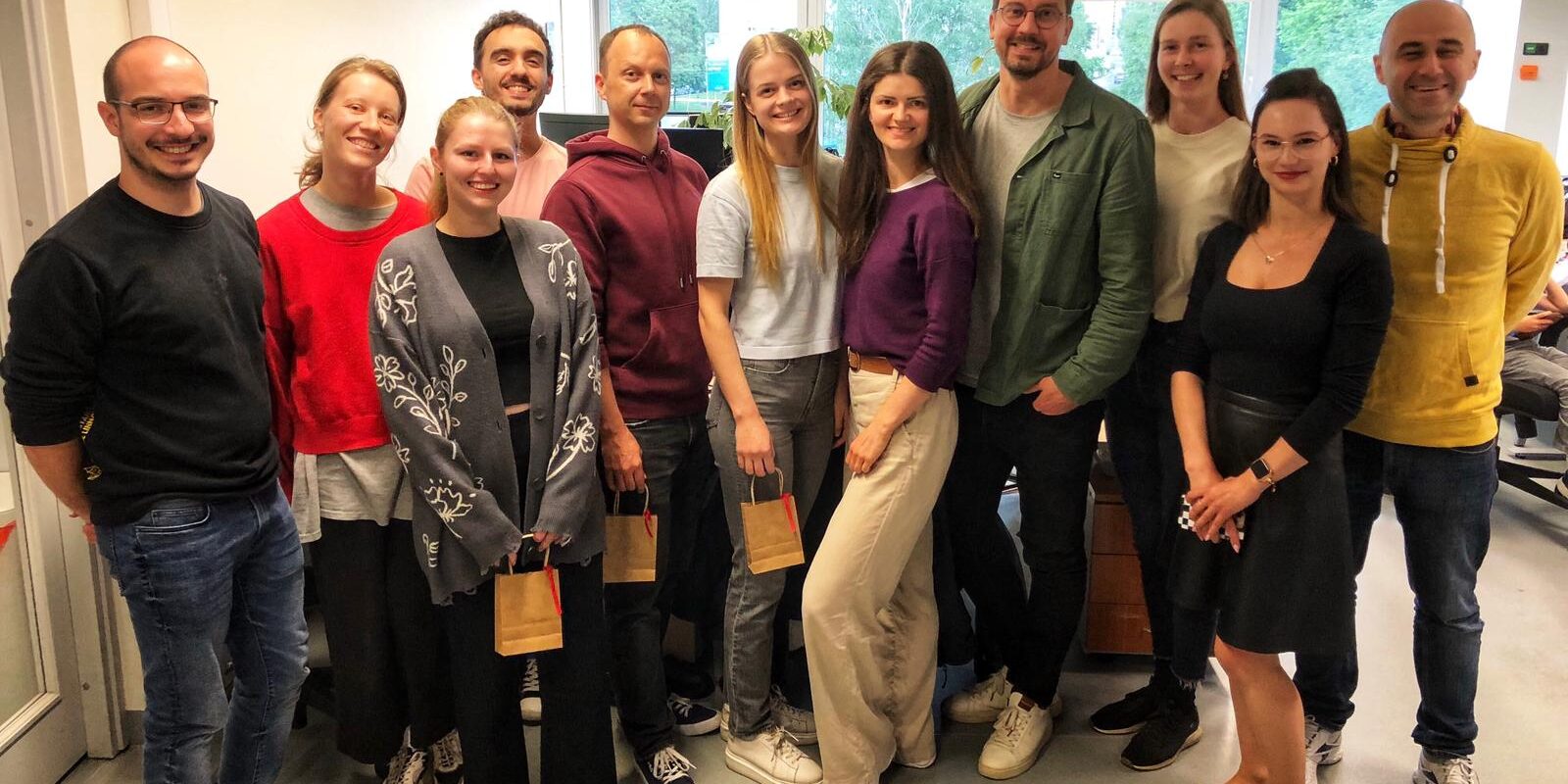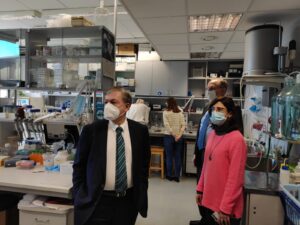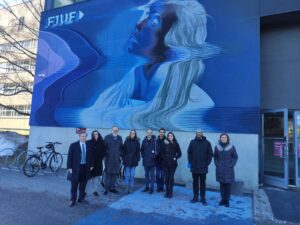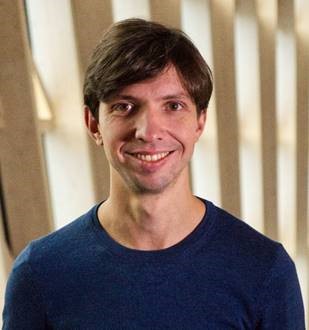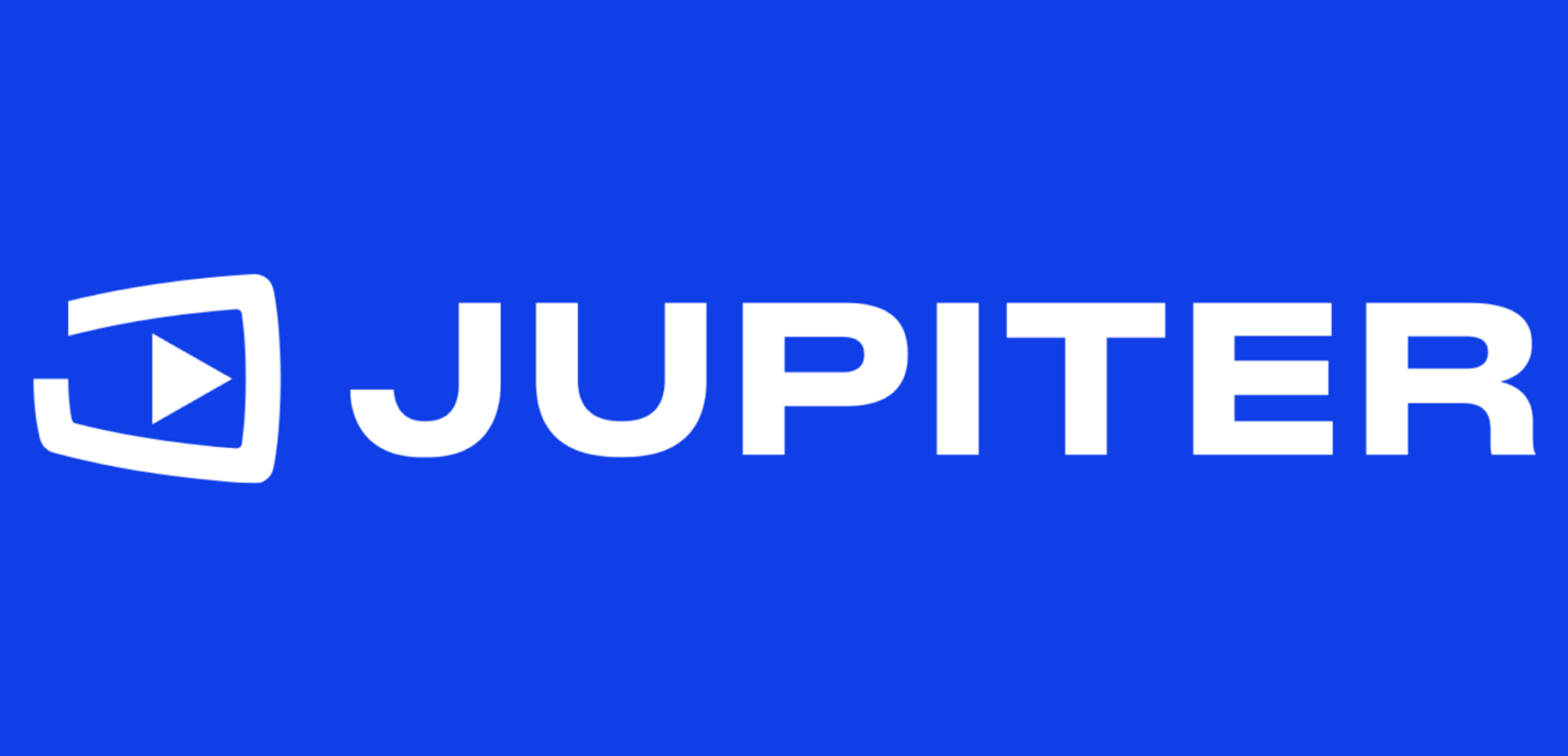Doctoral student Alīna Reķēna and biotechnology specialist Kaisa Orgusaar took part of Bioconnect consortsium meeting in Riga, Latvia. During the day, partners discussed action plan for facilitating Baltic biotech sector. It was also a wonderful opportunity for networking.
Growth profiler offers opportunites for high throughput microbial screening
As a part of biofoundry under establishment, bioengineering lab received its very own growth profiler. The state-of-the-art machine allows high throughput screening of microbial strains and growth media on µL scale. The Head of Automation Juliano Sabedotti de Biaggi described that the growth profiler can fit up to ten autoclavable 96-well microtiter plates, allowing monitoring 960 conditions at once. “However, usually the tests are conducted in triplicates which means monitoring of 320 strains or growth medias in parallel. The advantage of the microplates are that they can be covered with a lid, allowing control of gas exchange and evaporation. The machine is complemented with a camera which performs online optical density measurements, therefore obsoleting the need to measure each sample individually and manually.” With as many as 960 samples we are relieved to have this automated function!
The machine is a valuable asset for bioengineering laboratory as it offers the possibility of broader screening of microbial strains. Therefore microbial strains with different mutations can be screened at once, broadening the possibility to find the ones with best characteristics.
The growth profiler was sourced under DigiBio joint project with TalTech, University of Tartu and Danish Technical University, which received 15 million € from European Union and 15 million € from Estonian government.

Bioengineering and Fibenol joint project was nomi-nated for Tallinn Entrepreneurial Awards
Joint collaboration project between Bioengineering group and Fibenol “Biotechnological processing of wood and food waste into feed and food supplements” was one among the three nominees at Tallinn´s entrepreneurial awards. During the project wood industry residues, such as pre-processed sawdust was converted into healthy feed and food additives.
The project was funded from Environmental Investment Service.

Thank you for the recognition!
Scientists´ Night 2024
Bioengineering opened its laboratory for visitors for Scientists´ Night organized by TalTech. For one night, students, adults as well as children had the chance to explore fluoroscent bacteria, see 3D printing of hydrogels and engage in conversations with our doctoral students. The children had an opportunity to learn about nucleotides and build a sweet model of DNA helix. Moreover, they could have hands-on learning experience in the difference of plant and animal cells.
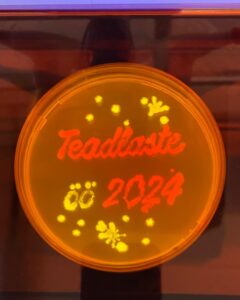
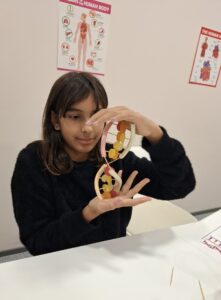
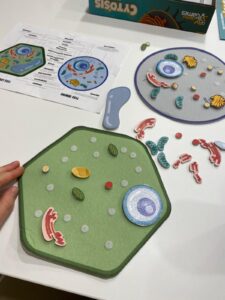
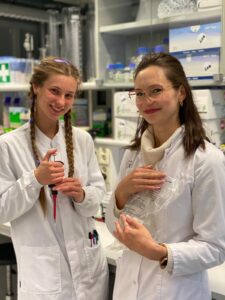
Henrique and Katharina participated at Engineering Living Materials Conference
Our doctoral student Henrique and visiting Master´s student Katharina participated in the 4th Engineered Living Materials conference in Saarbrücken, Germany. They presented current work done in the Bioengineering Group on biocontainment and novel matrix formation in hydrogels, respectively. The conference not only dealt with the technical aspects of the discipline, but also had a discussion on public outreach and regulatory hurdles to overcome for further development within the field. Participants got a better understanding of the ongoing research and the bottlenecks we all need to excel to grow our ideas further. In several interesting talks, new advances and inspiring ideas in the highly interdisciplinary field were shared. Some of Katharina´s highlights included alternative textiles from bacterial cellulose, fungi-based and biomineralized building materials and toxin-sensing materials.
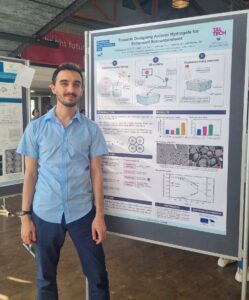
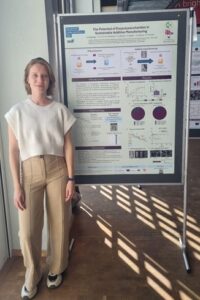
PhD student Alīna Rekēna visits MIT
PhD student Alīna Rekēna recently visitied MIT in the USA to meet our collaboration partners at the Voigt Lab and participate in project update meetings. The Bioengineering lab is engaged in an ongoing collaborative project focused on the environmental release of engineered bacteria in Soviet Estonia. The visit facilitated deeper collaboration and explored opportunities for TalTech – MIT student exchanges. Additionally, Alīna had the opportunity to present her own research activities and discuss upcoming project initiatives. The dedication and innovation at MIT are truly inspiring to spark new ideas for future work.
We are now looking forward to the kick-off meeting of the project in Tallinn on 23-24th September at the Estonian Academy of Arts. This gathering will be a valuable contribution to the project, where we aim to explore and integrate diverse perspectives on biotechnology’s role in historical and contemporary contexts.
Bioengineering summer event
The Bioengineering team took the most out of a brief Estonian summer and had a day bonding over open air activities. We had a day for sailing, hiking in Naissaare island and enjoying meals together. The time spent together sparked new conversations and created bonds between team members who may not communicate a lot during regular working hours. One of the interns commented: “I had so many conversations with people that I don´t normally talk to, it is worth a couple of months´ conversations within one day!”. Relaxed environment is a good opportunity to learn about the team members and everyone agreed that we had a lot of fun.
As an international team the learning moment of the day was intercultural communication. The participants were invited to step out of their comfort zones and participate in games which required performing tasks out of the box.
Students in bioengineering
Educating the next generation of researchers is important for sustainable science. Several master’s, bachelor’s, and guest students work daily in the bioengineering research group. Where do they come from, and how did they find their way to our lab?
Throughout this year, the bioengineering laboratory is welcoming 16 undergraduate and master’s students from six different countries, mostly from Estonia but also from as far as India, Pakistan, and Egypt, creating a diverse learning environment for the students. Involving students in research activities provides them with essential knowledge about scientific methods and hands-on experience that supplements their studies. Being actively involved, solving actual scientific problems, and seeing results inspires young people to advance further in their studies and explore yet-to-be-known topics.
Moreover, including the younger generation in active research benefits the research group as a whole. Our scientist, Srdjan Gavrilovic, who is supervising five students this year, commented: “Involving students in research is helpful in advancing more labour-intensive parts of research and exploring hypotheses.”
We also asked our visiting students, Sandra and Javeria, about their experience and how they found their way into the bioengineering lab. “We came to TalTech for one semester as part of the Erasmus Mundus scholarship. Petri-Jaan Lahtvee was our lecturer and he had an industrial project coming up with Fibenol, so he offered us this opportunity. We are just pursuing our master’s degrees, and conducting research together with an industrial producer was a wonderful way for us to explore both scopes – how research is conducted in a laboratory and how work is done in the industry. Having this experience allows us to explore both opportunities and decide whether we want to continue with PhD studies or start working in the industry. Our semester is now over, but we will stay until the end of summer and then continue our journeys.”
What an exciting era of life it is to travel and obtain experience within scientific groups internationally!
Three students defended their theses
Three undergraduate students successfully defended their theses that were conducted under the bioengineering laboratory.
- Kristjan Pals, BSc in gene technology 2024 “Phosphoketolase gene knockout by CRISPR/Cas9 in nonconventional yeast Rhodotorula toruloides” supervised by Alīna Reķēna
- Maive Hanni, BSc in gene technology 2024 “Comparison of genome-scale metabolic models for investigating lipogenesis metabolism in Rhodotorula toruloides” supervised by Alīna Reķēna
- Oksana Tingajeva, BSc in gene technology 2024 “Rhodotorula toruloides’ exopolysaccharides: production, optimization and characterization” supervised by Rahul Kumar and Henrique Sepulveda del Rio Hamacek.
The students noted that conducting theses in the bioengineering laboratory gave them valuable experience on how laboratory work is conducted and good time management skills. They learned how to investigate metabolism in silico, improving their programming skills in Python. R. toruloides is a notable lipid producer and knowing the more specific metabolic pathways allows creation of more efficient microbial cell factories. The theses are part of a wider picture which aims producing oils such as palm oil and biodiesel in a more sustainable way.
Read the full theses in TalTech digital library:
Master’s thesis projects in genetic engineering
Our lab will accept two master’s thesis students (local/ international/ Erasmus academic exchange).
The first project will focus on engineering of carotenoid pathway in non-conventional yeast Rhodotorula toruloides (as industrially important food colorants, pigments, pro-vitamins, and antioxidants).
The second project will focus on engineering of lipid metabolism in non-conventional yeast Rhodotorula toruloides (as industrially important macronutrients, essential fatty acids, biofuel, and industrial biopolymer components).
If you are interested, please contact us on inna.lipova@taltech.ee
TalTech Science Day 2023 was a success!
The Science Day event at the Department of Chemistry and Biotechnology took place on April 28, and our research group organised a workshop Future Food From Microbes for the 2nd consecutive time. This year, participants had an opportunity to take part in guided experiments in our laboratories on fermentation technologies and metabolic engineering, and engage in stimulating discussions with our team members. Anyone interested in molecular biology, bioreactors, or other biotechnology disciplines was offered something interesting.
For the participants, it was a perfect chance to learn, explore, and interact with scientists who share enthusiasm for science. For us, the Thanksgiving celebration served as a wonderful opportunity to reflect on the achievements and milestones we reached during the Science Day. We are truly grateful for the organisation by the department, which enabled us to create an engaging and enriching experience for the high school students. We look forward to future events that will continue to inspire and ignite the curiosity of young minds!
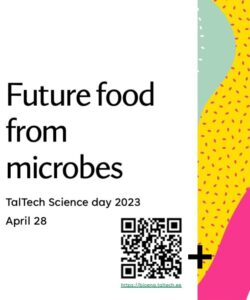
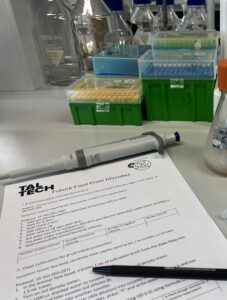
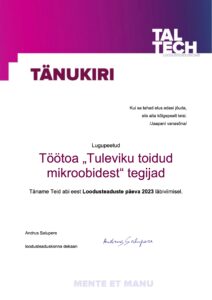
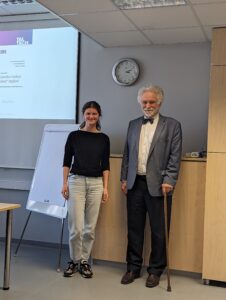
Master’s Thesis Projects (2023 – 2024)
Our lab will accept two master’s thesis students (local/ international/ Erasmus academic exchange) this summer. These thesis projects combine aspects of chemistry, chemical engineering, materials science, and biology to develop engineered living materials for biochemical production. The first project envisions the fabrication of functional living materials, while the second project focuses on the design and application of flow bioreactors.
The thesis projects will require two semesters for completion, starting in the summer of 2023. Therefore, students expecting graduation in the summer of 2024 are welcome to apply. We will consider students having a materials science, chemistry, biology, polymer science, chemical engineering, food technology, biotechnology, or an interdisciplinary background.
More information and how to apply: HERE
TalTech Science Day 2022
On April 29, TalTech Science Day 2022 event took place at the Department of Chemistry and Biotechnology. Food Tech and Bioengineering group organised a workshop “Future food from microbes”. The workshop was devoted to the production of bread and introducing yeast-based cell factories. Participants were introduced to bread baking technologies and experiments improving nutritional value of bread and beyond. The general feedback of the workshops was very positive, 86 % of participants graded it with 9 or 10 in a 10-point scale. More about the workshop, in pictures.
Altogether, Science Day 2022 at Department of Chemistry and Biotechnology offered 19 different workshops that were attended by 89 participants. Majority of workshop participants were high school students, but almost every 4th participant was from outside educational system. Next time it is going to be more focused on high school students and is planned for the next year 2023.
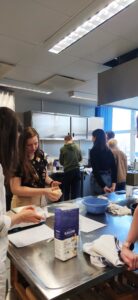
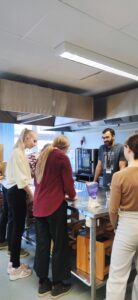
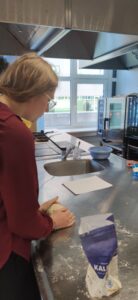
Students of the MSc. Biological and Chemical Engineering for a Sustainable Bio-economy
Four Erasmus Mundus Students of the MSc. Biological and Chemical Engineering for a Sustainable Bio-economy joined our group until June. Ariyan Amirifar, Belén Fernández de Caleya Ramiro, George William Ssendagala and José Gustavo Varona García will develop a metabolically engineered yeast strain of R. toruloides that will use lignocellulosic biomass (Brewer’s Spent Grain – BSG) as a substrate to produce monoterpenes. The produced terpenes shall be used (instead of hops) during fermentation to produce the distinctive beer flavor. This project will ultimately contribute to circularity in the brewing industry by supporting the valorization of BSG to create a useful product that can in turn be used by the same brewing industry.
Development of a dedicated Golden Gate Assembly platform (RtGGA) for Rhodotorula toruloides
We are thrilled to announce the recent publication on BioRXiv of the Golden Gate Assembly platform for R. Toruloides. Congratulations to the authors for this achievement that will guide and help doing scientific advancement.
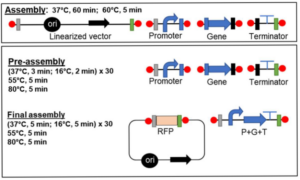
Visit of the Brazil Ambassador
Seminar by Dr. Francesco Gatto, co-founder and CSO of Elypta
In this seminar, Dr. Francesco Gatto illustrates how his group investigated regulation of cancer metabolism using systems biology approaches leading to the discovery of potential cancer biomarkers for early detection. The talk further focuses on the challenge to translate fundamental discoveries in clinical practice and the foundation of Elypta – a start-up university spin-off that is executing this transition.
PhD seminar
On Friday 18th of february, our three freshly started PhD students gave a seminar to introduce their working plans.
- Alina Reķena – Advanced modeling approaches in yeast
The presentation introduced basic principles of constraint-based modeling together with advanced modeling techniques, such as proteome allocation and thermodynamics-based constraints. Current project is focused on model development for non-conventional yeast Rhodotorula toruloides.
2. Gabriel Luz Chaves – Engineering R. toruloides for improved lipid production
In this seminar was discussed the use of non-conventional yeast, R. toruloides, for the production of lipids and the application of synthetic biology tools for strain improvement.
3. Henrique Sepulveda – Development of 3D printed engineered living materials for growth-decoupled biochemicals production
The topics of 3D printing and engineered living materials for biochemicals production was introduced in this seminar. Followed by a talk about our current research goals for the Ph.D. Project.
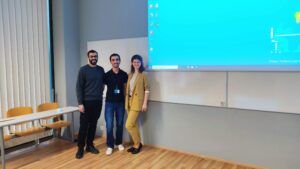
From left: Gabriel, Henrique and Alina
Feel free to watch the seminar record
Bioengineering concepts introduced at the Estonian national TV broadcast ‘Center of excellence for curiosity’
Petri Lahtvee introduced the concepts and opportunities, but also potential threats of bioengineering and synthetic biology at the Estonian national TV (ETV) broadcast ‘Center of Excellence for curiosity’ (Uudishimu tippkeskus).
The broadcast can be streamed (Season 4; Episode 12. Only in Estonian) here.
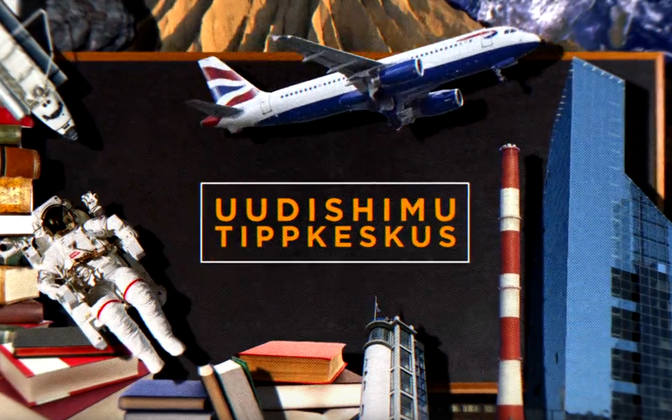
Pilot up-scale cultivations
In the course of the PERFECOAT project, Nemailla Bonturi and Petri Lahtvee visited Technical University of Munich (TUM, Straubing, Germany) to perform for the first time to our knowledge industrial scale (30L bioreactor) cultivations of R. toruloides in xylose-rich hydrolysate (Fibenol, Estonia).


Petri-Jaan Lahtvee (Taltech),
and Nemailla Bonturi (Taltech)


biomass containing high content of carotenoids.


using R. toruloides biomass
as binders.
